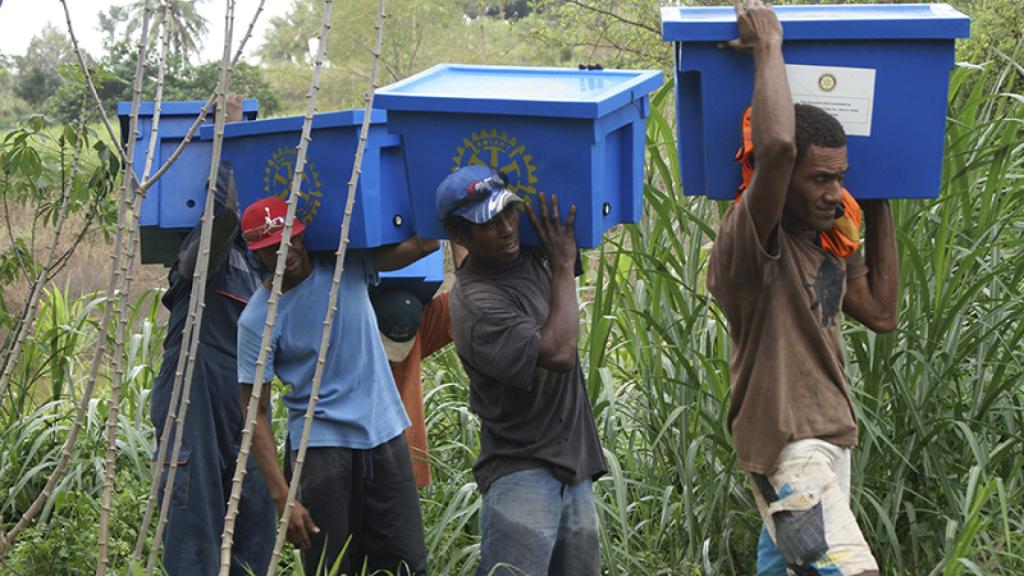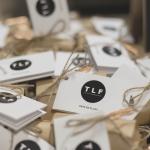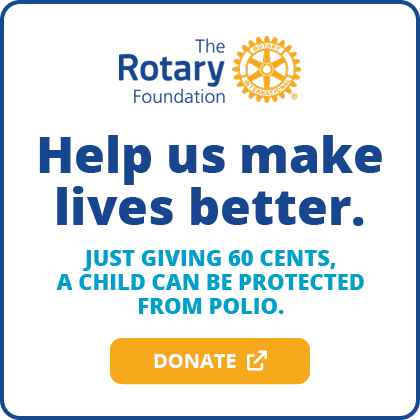Emergency Response Kits: Rotary’s first responders

Emergency boxes were first introduced in 1983 by the Rotary Club of Eastern Hutt, NZ. The concept was a box, targeted at the Pacific Islands, providing immediate needs for a family that had lost its possessions in a cyclone or similar event.
The box was a wooden flat pack for assembly and filling by clubs according to a supplied list. As the idea spread to the other districts several problems emerged, such as three different types of boxes plus a whole raft of unofficial ones.
The discrepancies between contents caused problems with Customs clearance at the recipient borders.
In 2009, RNZWCS Ltd. established a national standard, namely the Emergency Response Kits (ERKs). The now standard box is a plastic container which, when emptied, can contain 75 litres of water. The box is filled with 100 per cent new contents, obtained with generous discounts from suppliers and packed by volunteer teams. The introduction of hygiene products within the kit is recognition that Rotary takes the needs of the most vulnerable seriously. Rotary listens to the end user and adjusts the contents accordingly.
ERK’s are distributed following disasters such as tsunami, cyclones and floods in the South Pacific. The most pressing need is for basic supplies to help a family survive the first few days. They need shelter, food, clothing, drinking water, bedding, tools and medical supplies. As people can be difficult to reach, kits must be light enough to be airlifted and carried by two people.
With a little ingenuity, families can create a shelter from tarpaulins using the hammer and nails provided. There’s a folding shovel for digging trenches. Food is key, so there’s fishing gear, a hunting knife, and cooking equipment. There is basic clothing and bed covers for warmth. A medical pack with items such as soap, painkillers and antiseptic cream provides for basic healthcare.
Since 2010, with the financial support of the Ministry of Foreign Affairs and Trade (MFAT), 600 ERKs have been pre-positioned in the Cook Islands, Fiji, Samoa, Tonga, Vanuatu and Auckland.
Rotarian Nick Hurley represented New Zealand as High Commissioner to several Pacific Island countries. As Nick recalls: “I experienced first-hand the real value of the ERKs in 2012 in Samoa as High Commissioner and as a member of the Rotary Club of Apia. “Cyclone Evan hit Samoa in December that year with surprising fury. Our Rotary club was out there delivering much needed ERKs on the first day after the disaster. Fortunately, we were able to use kits that were already pre-positioned in Apia. The ERKs were and remain a key part of the Samoa Government’s strategy for disaster response.”
Related news
Dubbo West Community Carols by Candlelight
Celebrate the festive season at Dubbo’s Carols by Candlelight, promising fun, music and the big man himself.
Sanitation solutions in Sumba
By PDG John KevanRotary Club of Mandurah Districts, WA In East Sumba, where the financial capacity to support water and health requirements for villages in remote areas is severely limited, Fair Future Foundation has been successfully providing materials and training to enable villagers to build their water and sanitation facilities for more than 15 years. […]
Queanbeyan delivers U-Turn the Wheel pilot program
Throughout May, the Rotary Club of Queanbeyan, NSW, held the 2024 pilot program of U-Turn the Wheel (UTTW) at three local high schools in Queanbeyan – The Anglican School at Googong, Karabar High School, and Queanbeyan High School. Overall, approximately 125 students took part in the one-day program. Feedback from students and staff was positive, […]
Join our newsletter for the latest updates
"*" indicates required fields


